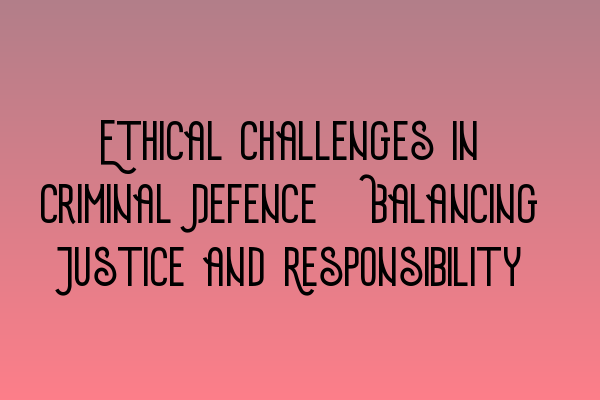Ethical Challenges in Criminal Defence: Balancing Justice and Responsibility
As criminal defence solicitors, we navigate a complex landscape of legal challenges, ethical dilemmas, and the responsibility to uphold justice. Our role is not just about representing our clients, but also about ensuring fairness and maintaining the integrity of the criminal justice system. In this blog post, we will explore some of the key ethical challenges faced by criminal defence solicitors and discuss how they can strike a balance between justice and responsibility.
The Duty to Defend
One of the fundamental principles of criminal defence is the duty to defend our clients to the best of our abilities. Regardless of the nature of the crime, it is our duty as solicitors to provide a robust defence and ensure that our clients’ rights are protected. This means challenging the prosecution’s case, scrutinizing the evidence, and ensuring a fair trial for our clients.
However, this duty to defend can sometimes clash with our ethical obligations. There may be instances where we are aware of our client’s guilt, but still need to provide an effective defence. This ethical dilemma puts us in a difficult position, as we must navigate between our duty to the client and our responsibility to the court and the justice system.
Confidentiality and Professional Privilege
Another ethical challenge faced by criminal defence solicitors is the protection of client confidentiality and professional privilege. We are bound by strict rules of confidentiality, which means that we cannot disclose information shared by our clients without their consent. This ensures that clients can trust us with their sensitive information, enabling us to build a strong defence case.
However, there may be situations where this confidentiality conflicts with our duties to society. For example, if we become aware that our client intends to commit further crimes or harm others, we may face the challenge of balancing our duty to protect client confidentiality with our responsibility to prevent harm to others. In such cases, we must consider the potential consequences and seek guidance from our professional bodies and regulatory authorities.
Professional Integrity and Impartiality
As criminal defence solicitors, we are expected to maintain professional integrity and impartiality throughout our practice. We must present the facts, evidence, and arguments objectively, regardless of our personal beliefs or opinions. Our duty is to represent our clients and protect their rights, rather than passing moral judgment on their actions.
However, this commitment to impartiality can be challenging, especially in cases where the alleged crimes are heinous or morally reprehensible. Striking a balance between our commitment to justice and our personal values requires careful reflection and a commitment to upholding the principles of fairness and the rule of law.
Conclusion
Ethical challenges in criminal defence are an inherent part of our profession. As solicitors, we must navigate these challenges with a deep understanding of our responsibilities and a commitment to upholding justice. The duty to defend, client confidentiality, professional integrity, and impartiality are key ethical considerations that shape our practice.
To overcome these challenges, we must constantly educate ourselves, seek guidance from our peers and regulatory bodies, and maintain open and honest communication with our clients. By striking a balance between justice and responsibility, we can fulfill our role as criminal defence solicitors while upholding the principles that underpin our legal system.
Related Articles:
SQE 1 Practice Exam Questions,
SQE 1 Practice Mocks FLK1 FLK2,
SQE 2 Preparation Courses,
SQE 1 Preparation Courses,
SRA SQE Exam Dates.
